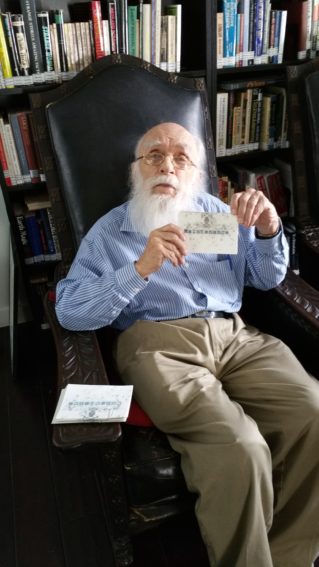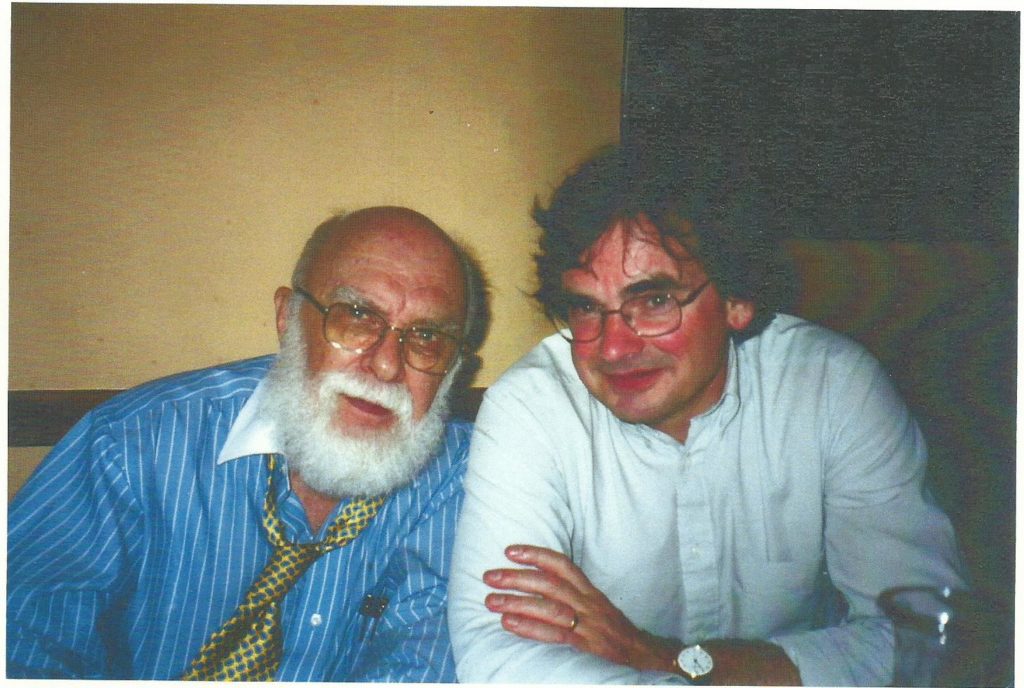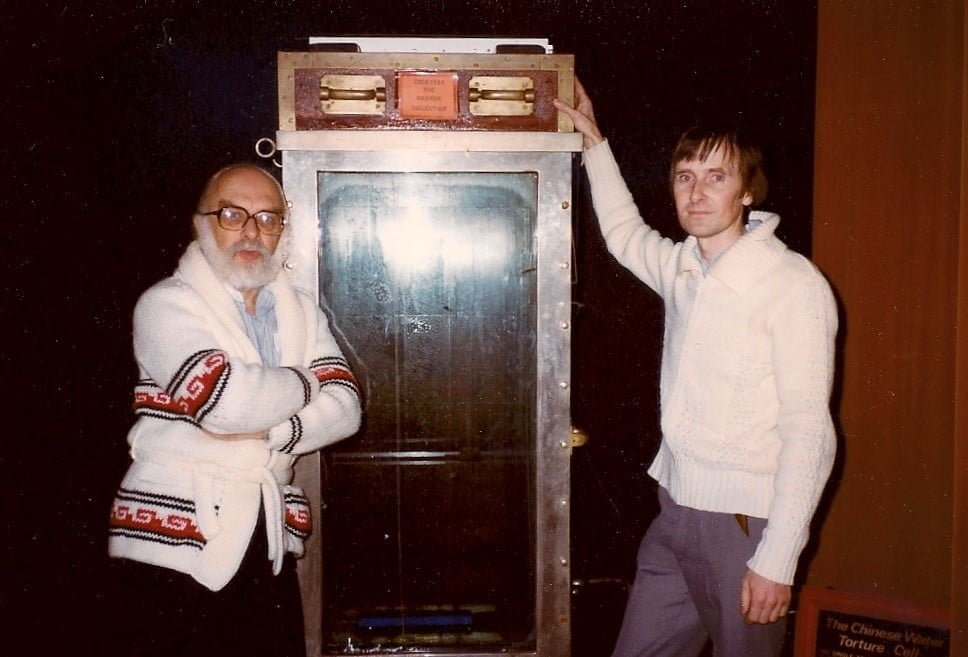James Randi, the grandfather of the modern skeptical movement, passed away on Wednesday, after over 70 years in the public eye as a hugely influential magician and internationally-renowned investigator of pseudoscientific claims.
In celebration of his phenomenal career and legacy, we asked our editorial team, along with some of the UK skeptics who knew Randi and were strongly influenced by him, to share their memories of the quintessential skeptical icon.
Editor-in-Chief, Michael Marshall: “I had the pleasure of meeting Randi in person just once, in 2010 when I was still a new to the world of skepticism; I sincerely wish our paths had crossed more often. On behalf of The Skeptic, I’d like to say farewell to a titan in our field; an entertainer, a teacher and a legend. Few people leave so indelible a mark on the world for so many people.”

Founding Editor and former Editor-in-Chief Wendy Grossman: “Randi inspired me, like so many others, to join the skeptical movement. I had run across so many claims I was doubtful about, but Randi was the one who showed me how they could be challenged and examined. He was relentlessly curious and full of energy, even late in his long life. We will miss him.”
Advisor and former Editor-in-Chief Professor Chris French: “If sceptics were allowed to have patron saints – which of course we’re not – there is little doubt in my mind that the person to occupy that role would be James Randi.”
Advisor and former Editor-in-Chief Deborah Hyde: “The ’70s was a weird time – ESP, poltergeists, spoon-bending. Plenty of people were being credulous but not many were being critical, so we were fortunate to have James Randi. He taught us how to protect ourselves from charlatans and quacks. The modern skeptic movement would not be what it is today without him.”
Professor Richard Wiseman: “Randi was the reason I got into skepticism. As a teenager I read Flim Flam, and was inspired by its beguiling mix of science and showmanship. Later on, I had the privilege of working with him on many occasions. Once, we attended the premier of An Honest Liar in NYC. Early on in the evening I saw Randi secretly prepare for a trick, and was looking forward to the performance. Two hours later, he still hadn’t performed any magic. Then someone asked him to do a trick and he acted surprised, and then performed the trick that he had secretly prepared right at the start of the evening. It blew everyone away because there was no explanation for his seemingly impromptu miracle. That was Randi. He understood magic. He understood scepticism. Most important of all, he understood people. He was fearless in his pursuit of pseudoscience and quackery, and inspired many to follow in his footsteps. Randi helped to lay the foundations for modern-day scepticism, has left a tremendous body of impactful work and made the world a better place. Amazing.”
Derren Brown: “I had grown up adoring James’s work, which made it exciting to speak with him about faith healing several years ago, when I was researching for a project of my own. Although we never met, we then became friendly via email. What a truly amazing man, and an extraordinary career: he has approached something close to immortality. Long, long live Randi.”
Professor Mike Heap: “I think the first time I saw Randi was at a CSICOP conference at UCL in 1983. It was at this meeting that I knew skepticism was for me and I started subscribing to the Skeptical Inquirer. Later I attended European and World Congresses and must have been introduced to Randi at one of these. Thereafter I would bump into him at these conferences and to my surprise he always remembered me and we would have a good chat. Occasionally we would exchange emails and once he asked for a Skype session. I wondered what it was all about and it transpired that he wanted to advise me to use tiny URLs for the Skeptical Intelligencer!
“I think that aside from his amazing achievements, the thing that makes Randi memorable for me is his personality, his appreciation of absurdity, and his being a real gentleman who always had time to talk to you, whoever you were.”

Simon Singh: “Watching Randi on TV as a kid got me into skepticism, so it was an honour to meet him and share a platform with him. In my eyes, he was a hero, a legend and an inspiration. (My son said I should not call Randi a god, but I think he is wrong.) And, in my darkest hour, when I was sued for libel and facing defeat, Randi and Phil Plait wrote to me explaining that they (and JREF) had my back. Skeptics around the world had blogged and tweeted their support for me, and that made a huge difference, but the email from JREF gave me the confidence to continue the fight. After all, Randi had been sued for libel on more than one occasion and always stood strong. I am very happy that my older son got to meet Randi, and of course he was blessed with a magic trick and some wise patter. My younger son missed out, having not yet been born, but I will make sure he grows up to know all about the adventures of the Amazing Randi.”
Mike Hutchinson: “I was fortunate to call Randi “Friend”. I first wrote to him in 1976 having seen his address in The Magic of Uri Geller (later republished as The Truth About Uri Geller) and met him a year later when he visited London. I had arranged for him to do three radio interviews, and it was enlightening to see in person how he fooled presenters by bending their spoons. Over the subsequent decades I’d guess that I spent a total of many weeks in his company both in the USA and the UK. We spent the best part of two weeks together when he was doing the UK filming of the documentary Magic or Miracle in 1983. In addition to being his driver I had also arranged for filming to take place at a Stonehenge sunrise.
“Randi was possibly more unique than many people realise. In spite of skeptical thought to the contrary, few magicians are as qualified to test psychics as Randi was. As an escapologist who had escaped from 28 jails he was an opportunist, just like psychics are. He was also very clever, the cleverest person I have met. His knowledge was all-encompassing. I was present on a number of occasions when Randi spoke to scientists and demonstrated his knowledge of their subjects. Former editor of Nature, Sir John Maddox agreed, and told me that he too considered Randi to be one of the cleverest people he’d met.
“Randi wouldn’t have been the Randi we know if he hadn’t also had a big heart, which was what was behind his fight for the truth. I’m sure that he put his magic career second in order to combat pseudoscience. Not that he wasn’t famous as a magician and escapologist. In 1978 the BBC produced The Amazing Randi Show, a one hour show in which he performed Houdini’s milk can escape. Unfortunately it doesn’t appear to be on YouTube.
“Thank you Randi, for allowing me into your unique world, and for having such a big influence on my life. I learned a lot from you, and like many thousands, will miss you, especially our long, highly entertaining Skype calls.”

Sid Rodrigues: “I knew of Randi from being a young magician and first saw him on TV on Channel 4’s The Secret Caberet – with Simon Drake. He used to tell stories of his psychic investigations and reveal the methods they would use. In 1991 he had a show of his own on ITV, called James Randi: Psychic Investigator. The show came with a book of the series which I bought from a local shop and read. In the back it had – the then – Randi’s $10,000 challenge to psychics with an address to send their details to agree to the challenge. I took the opportunity to write to that address in the US, thanking him on a great show and showing how to properly test psychics using scientific methods. I was only 13 at the time and didn’t think I’d receive a reply, but a month later I did receive a handwritten letter from Randi and continued regular correspondence with him by post for many years from his travels all over the world. He was very good at making time for people, even ones he didn’t know. From that exchange I entered the world of Skepticism and attended Skeptics in the Pub in 1999 when it was first run by Scott Campbell at Waterloo and the rest, they say, is history.
“Randi was more of a family member to me than just a friend. He was the big brother that gave me advice when I needed it and made sure I was doing okay. He will be missed dearly.”
Robin Ince: “James Randi is the reason I got back into science. I bought his book Psychic Investigator in a small town famed for witch trials, the right place to be lured to scepticism. From that point, I became fascinated in why we believe what we believe and how easily we can be duped however clever we believe we might be.
“Sometimes people might accuse Randi of being a smart aleck but that smart aleckry was connected to compassion and genuine concern for humanity. I saw this when I interviewed him for London’s 2010 Amazing Meeting.
“One of his most famous cases was Peter Popoff, a minister who was stunningly accurate. God would tell him the full names and addresses of the sickly people in his audience and exactly what was wrong with them. He would then heal them with his touch and watch the donations flood in. It tuns out his god was an earpiece that broadcast his wife’s specific instructions based on information the audience had volunteered on entry. His gift from God was actually a purchase from a high end electrical store.
“Forty years on, it was clear that he was still disgusted and disturbed that Popoff could abuse and manipulate people. His voice cracked when he recalled some of the abusive, dismissive and derogatory language that was used to describe the people Popoff’s wife was leading him too. Not only were they fleecing these people, they were laughing at them as they did so. Randi’s disgust was still palpable.
“Despite his duplicity being broadcast to a nation, Popoff’s ministry survived and still sells miracle water that you are warned not drink. Randi never gave up. The grifters and hucksters still found their markets, but he never tired of standing up and calling them out and arming many of us with the critical thinking tools to arm ourselves and other people.
“He has left the world with more sceptics in it and we need them now more than ever.”



